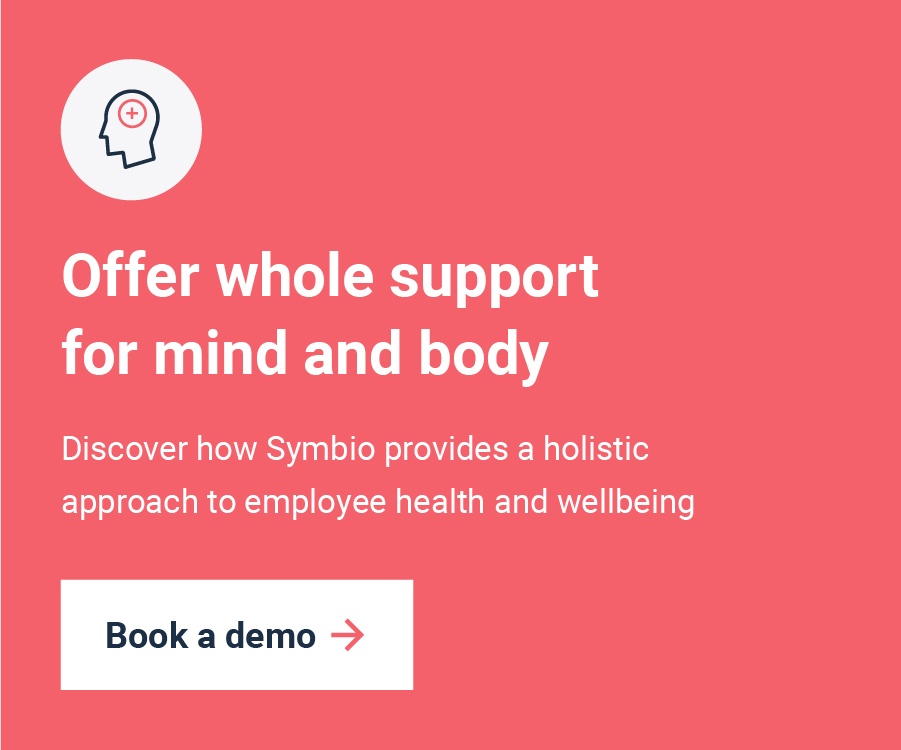Holistic healthcare recognises the connection and balance between physical, mental, and spiritual wellbeing. Rather than concentrating on episodic care, it looks at the interaction between different conditions and wellbeing factors to treat a whole person. It aims to prevent, as well as treat, health issues.
Ten years ago, NHS England, along with other national partners, signed up to a series of commitments to support integrated care. The purpose included:
- improve outcomes in population health and healthcare
- tackle inequalities in outcomes, experience and access
- enhance productivity and value for money
Today this same challenge and opportunity is set for employers. Eighty seven percent of employees expect their employer to support them in balancing work and personal commitments. Yet nearly one in five employers aren't doing anything to improve employee health and wellbeing.
There are significant benefits to proactively addressing workforce wellbeing. And the most valuable approach is a holistic one. Let’s explore why.
Why does holistic healthcare matter for businesses?
For senior HR leaders, taking a holistic approach to wellbeing comes with a variety of advantages. According to the CIPD’s Health and wellbeing at work 2022 report:
- 48 percent of HR leaders agree their organisation’s employee health and wellbeing strategy has created a healthier and more inclusive culture.
- 46 percent agree that it has created better employee morale and engagement.
- 33 percent agree that it has created more effective working relationships.
- 27 percent agree that it has improved productivity.
Beyond the business benefits, holistic healthcare is beneficial for the individual, too. Here’s why.
Why is it important to treat a person holistically?
Over the next decade, there will be 3.7 million more workers aged between 50 and the state pension age. At the same time, Generations Z and Alpha are establishing their place in the workforce.
A holistic approach to health is an excellent way to support an inclusive workplace. There's no ‘one-size-fits-all’ when it comes to health. What it means to ‘live well’ looks different for different people. So, you need to find a way to cater to every individual's unique needs.
Currently, only half of all organisations take a strategic approach to employee wellbeing. Over a third remain reactive to employee needs. For you to stand out, you need to actively listen to every employee and find ways to serve their needs. And having done so, you then need to find wellbeing solutions that cater to those requirements.
The bottom line? Develop a wellness strategy that has the flexibility to meet myriad needs and you will start to see tangible benefits.
Understanding the connection between mind and body
The connection between mind and body is indisputable. Many studies show that physical wellness is directly influenced by mental wellness, and vice versa. In fact, having a serious mental illness can reduce your life expectancy by 10 to 20 years due to the impact it has across your body. This includes increased risk of heart disease, as well as a possible increase in your risk of cancer.
In the workplace, mental health concerns are the top cause of long-term employee absences at work and economic inactivity in the UK. What's more, psychological conditions like severe anxiety and depression impact creativity and productivity.
79 percent of UK adults feel stressed at least once per month. And approximately two in three employees believe work is a significant source of stress. As an HR leader, it’s imperative you understand and advocate for mind-body wellness at work. Find creative ways to promote holistic health strategies and offer teams the relevant support to ensure they bring their best selves to work.
Why the holistic approach is so valuable
1. A happier and more productive workforce
28 percent of workers report that workplace stress decreases productivity. It’s therefore critical that you find ways to address it. What’s more, happier employees are approximately 12 percent more productive.
Holistic health is important because it acts as a core enabler of employee happiness and productivity. There is an indisputable connection between good health and wellbeing and a reduction in stress. And unsurprisingly, reducing stress boosts happiness, which in turn increases productivity.
2. Healthier employees
In addition to employee happiness is employee health. In the UK, musculoskeletal (MSK) conditions affect 1 in 4 of the adult population. A large proportion of these conditions affect young working people who experience daily symptoms including pain, stiffness, and limited movement.
Taking a holistic approach to health helps employees better manage not only the symptoms that arise from conditions like MSK, but also the root causes. These often include repetitive daily motion, inactivity, and overwork. Plus, it helps them manage the emotional burden that comes with chronic pain.
3. Reduced presenteeism and leavism
Presenteeism can cost your company £4,000 in lost business per employee, each year. Despite this, only 30 percent of HR leaders report their organisation has taken steps to tackle it.
You can reduce instances of presenteeism and leavism with a holistic wellbeing strategy. This ensures employees take the time they need to recover and return to work stronger than ever. It also allows them to then maintain their wellbeing while at work. This reduces the risk of relapse and increases focus and productivity.
4. Increased employee retention and reduced turnover
Stressed employees are more than three times as likely to seek employment elsewhere compared to their less-stressed co-workers.
To reduce the risk of turnover, ensure managers offer regular check-ins with employees. This helps you monitor employee wellbeing and mitigate any impending departures.
Your commitment to the health of your workforce goes a long way in creating trust and respect. In turn, this generates engagement and builds loyalty.
Create a holistic healthcare strategy at your workplace
A holistic healthcare strategy balances physical, emotional, and mental wellbeing. In turn, this encourages employees to take care of their entire selves. And in return, your employees will bring their entire selves into the workplace.
Our wellbeing platform offers employees the opportunity to receive personalised wellbeing advice within a single, streamlined solution. It equips employees with everything they need to take care of their whole health. This includes regular check-ins and engaging self-guided programmes. It also includes personalised chatbots, and access to specialist follow-up care when needed.
To learn more about how to build a holistic healthcare strategy at your workplace, explore our core services here.



-1.jpeg?width=800&height=450&name=Untitled%20(6)-1.jpeg)

%20(1)-1.jpg?width=800&height=450&name=christina-wocintechchat-com-YCrgxs3e9lY-unsplash%20(1)%20(1)-1.jpg)